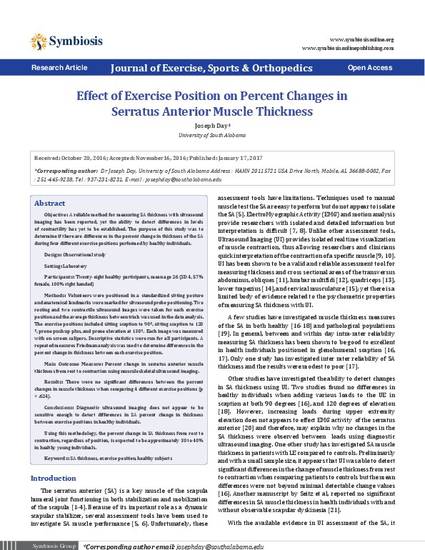
Objective: A reliable method for measuring SA thickness with ultrasound imaging has been reported, yet the ability to detect differences in levels of contractility has yet to be established. The purpose of this study was to determine if there are differences in the percent change in thickness of the SA during four different exercise positions performed by healthy individuals.
Design: Observational study
Setting: Laboratory
Participants: Twenty-eight healthy participants, mean age 26 (SD 4, 57% female, 100% right handed)
Methods: Volunteers were positioned in a standardized sitting posture and anatomical landmarks were marked for ultrasound probe positioning. Two resting and two contractile ultrasound images were taken for each exercise position and the average thickness between trials was used in the data analysis. The exercise positions included sitting scaption to 90º, sitting scaption to 120º, prone push up plus, and prone elevation at 130º. Each image was measured with on-screen calipers. Descriptive statistics were run for all participants. A repeated measures Friedman analysis was used to determine differences in the percent change in thickness between each exercise position.
Main Outcome Measure: Percent change in serratus anterior muscle thickness from rest to contraction using musculoskeletal ultrasound imaging.
Results: There were no significant differences between the percent changes in muscle thickness when comparing 4 different exercise positions (p = .624).
Conclusions: Diagnostic ultrasound imaging does not appear to be sensitive enough to detect differences in SA percent change in thickness between exercise positions in healthy individuals.
Using this methodology, the percent change in SA thickness from rest to contraction, regardless of position, is expected to be approximately 30 to 40% in healthy young individuals.
Available at: http://works.bepress.com/joseph-day/1/
This document has been made available for download in accordance with the publisher's policy on open-access. DOI: https://doi.org/10.15226/2374-6904/4/1/00153
Permission documentation on file.